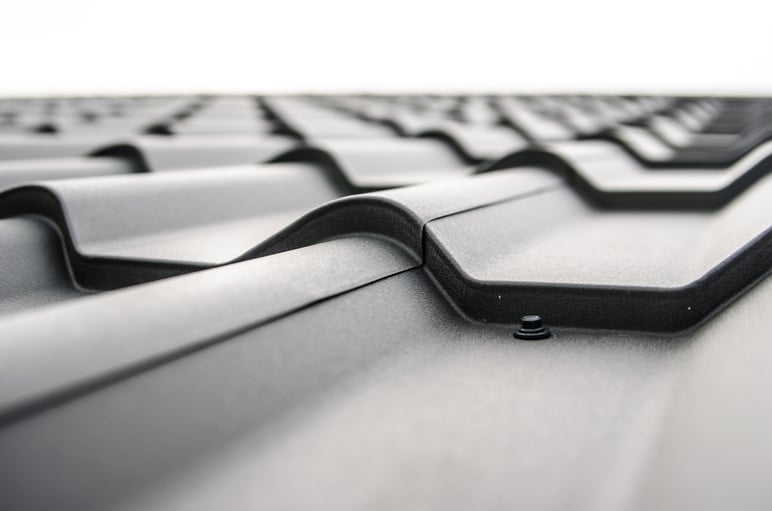According to the Metal Roofing Alliance, metal is one of the most energy-efficient roofing materials available. With a reflective finish and excellent insulation, a metal roof can save you up to 40% in energy costs. It’s a cost-effective option that can help you save money and energy over time. Learn why steel and other metal roofs can be more durable, energy efficient, and cost effective than traditional asphalt shingle roofs.
Are Steel Roofs More Durable Than Asphalt?
A metal roof's lifespan can range from 40 to 70 years, which is two or three times longer than the average asphalt shingle roof. Metal roofs also come with longer warranties, lasting 30 to 50 years, while asphalt shingle roofs generally come with 15-to-30-year warranties.
Metal roofs can withstand winds up to 140 mph as well as hail, extreme temperatures, and fire. They often carry Class A fire-resistant ratings and are noncombustible. Metal roofing requires little maintenance and is 100% recyclable, eliminating landfill concerns.
Why Are Metal Roofs Energy Efficient?
Metal roofing comes in a variety of finishes, including granular-coated or pre-painted materials. These finishes help reflect rather than absorb heat and UV rays to keep your home naturally cooler in the summer heat. Even without a reflective finish, a metal roof can reflect more solar energy than the average asphalt roof, which absorbs heat.
Adding cooling granules or pigmented coatings to your steel roof can lower its surface temperature by up to 100°F, according to Energy Star. These “cool roofs” can decrease your home’s indoor temperature, making your space more comfortable and reducing your need for air conditioning. Cool roofs can also help extend the life of your roof and allow you to downsize your HVAC equipment or reduce energy usage. Be sure to check into available rebates and incentives, including the Federal Energy Efficiency Tax Credits, if you install this type of roof.
How Cost Effective Are Steel Roofs?
Up front, asphalt shingles are less expensive than metal roofing materials. A metal roof can cost anywhere from $120 to $900 per 100 square feet. Asphalt shingles may only cost you $100 to $200 per 100 square feet. However, if you’re looking for a roof that will last, consider steel over asphalt. A steel roof could outlive you, so you never have to replace it! For more cost savings, check with your insurance company to see if they offer any metal roof discounts. Also, visit the Energy Star website to see what tax credits you may qualify for.
Steel roofs can outlast asphalt roofs by many years, making them cost effective over time. Additionally, a metal roof can enhance a home’s resale value. According to the 2020 Cost vs. Value Report by Remodeling magazine, the average homeowner in the West North Central region recouped 43.1% of the $40,318 cost of a metal roof replacement in increased home resale value alone. Nationwide, this average return is 61.2%.
Other Advantages of Installing a Metal Roof
Additional benefits of steel and other metal roofing include
- Modern aesthetic
- Curb appeal
- Sustainability
- Corrosion and insect resistance
- Moisture resistance
- Doesn’t crack under pressure
- Variety of colors and textures available
- Can be designed to resemble other roofing materials like slate, wood shakes, or clay tiles
Disadvantages of Metal Roofing Materials
Like all types of roofing materials, steel comes with some disadvantages.
- Installation is more challenging and may require specialized tools and knowledge. It leaves less room for error than asphalt shingle installation.
- It can be easier to repair asphalt shingles than metal roofing panels.
- Condensation can be a problem if your steel roof isn’t properly insulated and ventilated. See our article, “Metal Roofs and Condensation—Why It Happens and How to Stop It,” for advice on preventing this issue.
- Some metal roofs can be noisy during storms, but adding insulation can solve this problem.
- If the roof is installed poorly, your roofing system could succumb to damage. Water may accumulate and seep into areas that aren’t well sealed. Make sure you hire a qualified and reputable roofing contractor to install your new roof.
- Low quality metal materials can dent and rust if damaged. Softer metals like aluminum and copper are more prone to denting than stronger metals like steel.
- Steel roofs are more expensive than asphalt (but you get what you pay for in terms of strength and durability).
A steel roof can be a smart option if you’re planning to stay in your home for many years. You can choose a steel roof that mimics the appearance of traditional or high-end roofs but has the durability, longevity, and energy efficiency of metal. For more information on metal building materials and the building process, subscribe to the Pro-Line Building Blog!


.svg)